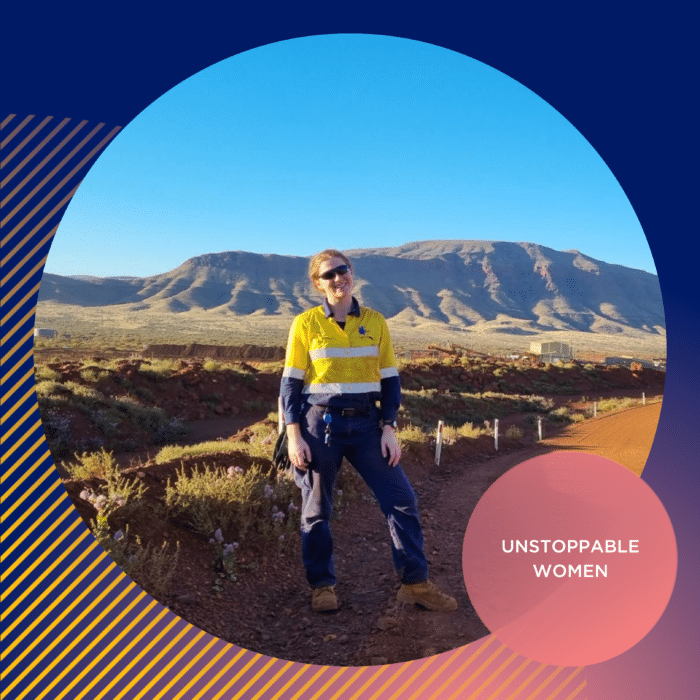Read more to find out about Keely’s interesting career journey, and how Strathy fostered a sense of curiosity and critical thinking, essential to her current work.
Can you explain your career journey to date?
My first role as an undergraduate mining engineer was at BHP’s Olympic Dam underground mine, where I also undertook my honours research. This was my first taste of mining- hot, humid, and dusty! I found I thrived being able to work underground, there is something about being 1km under the surface of the Earth that gets the adrenaline pumping.
Next, I was keen to try a different resource, so I worked for ExxonMobil in a production role. I was fortunate enough to spend some time working on an oil/gas rig in the Bass Strait. Coming and going from work in a helicopter as well as living on an operational offshore rig was an experience I will never forget.
Then, after working part-time as an analyst for a junior gold exploration company as I finished uni, I decided on moving to WA to work in Iron Ore (open-pit) with Rio Tinto. I worked Fly-In-Fly-Out (FIFO) in the Pilbara for about 2 years in various technical capacities, including short-term scheduling and drill+ blast. A highlight was working in blast crew for 6 months, where I worked with various types of explosives in a very physically intensive role.
Currently, I am working in Perth in Rio Tinto’s ‘Control Room’ as a Mine Scheduler (logistics) on a fantastic even-time roster (6 on 6 off). This role allows me to have a macro view of the entire Iron Ore supply chain, everything from the 14+ mines to trains to ports + ships and customer requirements. It is my role to control/ manage the grades (Fe content/ impurities) and volume output from the mines, to make sure they blend in a way that meets customer requirements. I enjoy it as every day contains new problems to solve, and I can interact with so many different teams across the business.
How did Strathcona prepare you for your chosen career?
Going to school at Strathcona was an environment that fostered curiosity and critical thinking about the world around me. I have always been naturally curious, but at school I remember feeling that I was always pushed to find out ‘why’ (especially in physics), to think for myself, and to question everything. This is something I have carried forward into my career- working with such large systems and supply chains allows me to regularly question established processes and apply critical thinking.
What did you study?
I studied a Bachelor of Mining Engineering (Hons) at Monash University.
Who/what was the major influence on your career path?
My dad- being a Civil Engineer- was a major influence on my career path, as it meant I knew STEM was a valid career option for me to pursue. My family shares a love of science and natural history, passion and curiosity was always encouraged when I was growing up.
When did you decide that this is what you wanted to do?
I always knew I would be involved with STEM, however when I was a participant of the NYSF (National Youth Science Forum) in year 12, my eyes were opened to an area of science I had never considered (geology and Earth sciences). At first I wanted to be a geophysicist, but during my time at university and after several site visits to mines across Australia, I was amazed by the complexity and scale of hard rock mining and so I transitioned to Mining Engineering. I still maintain the passion I have for geology though and am an avid rock collector.
What are your career highlights?
Something I have loved about my career is the opportunity it has provided me to travel to remote parts of Australia, many of which are very special and unique. Once I have a bit more experience in WA, I look forward to my next career move overseas, with internal opportunities available in Mongolia, Canada or the USA.
What day-to-day thing do you enjoy about your job?
Every day I am amazed by the scale of mining, particularly in Iron Ore. I am always talking in terms of kilotonnes or megatonnes that sometimes I have to take a step back and remember how much ore the supply chain is actually moving! I love being able to directly observe the impacts that my work has, and seeing it materialise instantly in terms of extra tonnes/ cost saving brings a lot of satisfaction. Overall, I’d say I get a lot of enjoyment out of making and observing tangible differences.
What core attributes do you need for your chosen career?
Attributes of being a good engineer of course include curiosity and creativity.
However, for the mining industry specifically, resilience is needed- especially starting out, when FIFO and isolated living arrangements can be a shock compared to normal life.
Having a good sense of humour is a must too! Although all many people in the mining industry might not be the kinds of people you would normally interact with, humour is something that brings everyone together.
What advice would you give to someone looking to start in your industry?
Don’t be fooled by common misconceptions about hard-rock mining- it is one of the most technologically advanced industries in the world and is a great environment for anyone wanting a challenging and interesting career that can take you to all kinds of places across the world.


